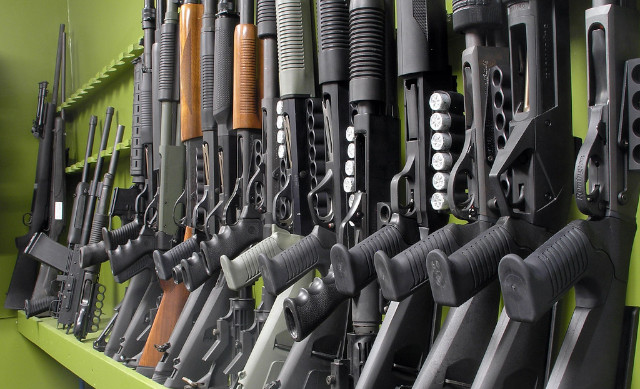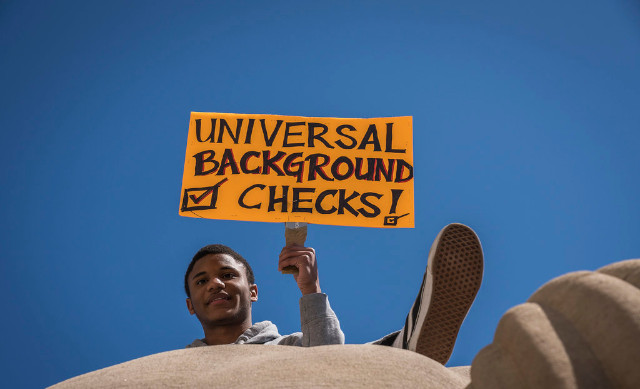By Marvin Marroquin • Updated: 02/22/2023 • 8 min read
As an advocate for the Second Amendment and someone who consistently stays up to date with gun laws and regulations, I’ve been asked countless times about the infamous “Gun Show Loophole.” So, what is it? Let’s dive into the details and uncover everything you need to know.
The term “Gun Show Loophole” refers to the exemption that allows private sellers to sell firearms without conducting background checks on buyers. This loophole is often associated with gun shows, but it can also occur in other settings where firearms are sold, such as online marketplaces or garage sales.
The term is frequently used by the media in discussions about gun control legislation and the regulations surrounding firearms sales. Here’s an example of how the term might be used in a news article:
“Criminals use the gun show and private sales loophole to get their guns, and then they use them to kill and injure.”
Politico: Closing gun show loophole is right
Is the “Gun Show Loophole” legal?
Yes, it is. Federal law doesn’t require private sellers to conduct background checks on buyers. However, licensed dealers are required to do so. The fundamental reason why is simply due to the fact that private sellers aren’t in the business of selling guns. Sure, an individual may sell a few guns throughout the year, but that’s nothing compared to the tens of thousands a licensed dealer will sell in the same amount of time. And if you’re operating in the business of selling guns, it makes sense to have the means to ensure you’re not selling to violent offenders.
The “Gun Show Loophole” is more of a misnomer than an actual loophole. There’s no specific law that exempts gun shows from conducting background checks. Instead, it’s the fact that private sales, including those that take place at gun shows, aren’t subject to the same regulations as sales made by licensed dealers.
Who are private sellers?
A private seller is an individual who sells a firearm from their personal collection or private inventory. They don’t have a federal firearms license (FFL) and don’t operate as a business. Because they don’t formally operate in the business of selling guns, they are simply selling private property.
Who are licensed dealers?
A licensed dealer is a business or individual who is licensed by the Bureau of Alcohol, Tobacco, Firearms, and Explosives (ATF) to operate in the business of selling firearms. They are required by federal law to conduct background checks on buyers, regardless of where the sale takes place.
Why is the “Gun Show Loophole” controversial?
First and foremost, as I mentioned, there is no “loophole.” This is just a term invented by the gun control lobby to make it seem like private gun sales are somehow shady or underhanded. But the truth is, private sales are a completely legal and legitimate way to buy and sell firearms, or any private property for that matter.

So why the controversy? Well, it all comes down to the never-ending battle between those who want to restrict our Second Amendment rights and those of us who believe in the individual’s right to keep and bear arms. The gun control lobby argues that background checks are an essential tool for keeping guns out of the hands of criminals and other dangerous individuals. And while that may sound good in theory, these checks don’t always work as intended in real life application.
For one thing, criminals don’t usually go through legal channels to buy their firearms. They get them on the black market or steal them. So even if every private seller at a gun show was required to conduct background checks, it wouldn’t make a bit of difference to someone who is determined to get a gun. They’ll continue to avoid submitting themselves to a background check, just like they already do now.
But here’s the real kicker: even when background checks are conducted, they often fail to catch people who shouldn’t be allowed to buy guns. Take the tragic shooting at Virginia Tech in 2007, for example. The shooter passed not one, but two background checks despite having a long history of mental illness. In the 2019 mass shooting in Dayton, Ohio, the shooter obtained his firearms legally through a licensed dealer, despite having a history of mental illness and drug use. In the 2017 shooting at a church in Sutherland Springs, Texas, the shooter was able to obtain firearms despite having a history of domestic violence that should have disqualified him from owning guns.
These cases demonstrate that background checks are not a cure for preventing gun violence, and that a more nuanced and comprehensive approach is needed to address the root causes of violence in our society. And while we can all agree that we want to keep guns out of the wrong hands, background checks are not the solution.
Arguments against the “Gun Show Loophole”
One of the core beliefs is that private sales are a constitutional right protected by the Second Amendment. It’s simply a matter of a fundamental aspect of private property rights and the free market, and it should not be subject to unnecessary government regulation. The government cannot compel an individual to register their firearms or keep records of private gun sales. Such requirements would be a violation of the Fourth Amendment’s protections against unreasonable searches and seizures, and would also undermine the privacy and security of law-abiding gun owners.
Another argument is that background checks won’t prevent criminals from obtaining firearms. Criminals don’t typically obtain firearms through legal means, such as licensed dealers or gun shows. Instead, they often obtain firearms through illegal means, such as theft, or the black market. Even if a criminal does attempt to purchase a firearm through legal channels, they can easily bypass the background check system by using false identification or having someone else purchase the firearm for them, which is illegal in itself.
Even if background checks were required on every gun sale, it would be completely unenforceable. The government can’t enforce every gun sale that happens in private, because … well, they’re done in private! And if that gun ends up being recovered at the scene of a violent crime, it’s too late. The damage has already been done. It never prevented the criminal from acquiring the gun in the first place.
Finally, the burden of conducting background checks shouldn’t fall on private sellers. If you’re a law-abiding gun owner who wants to sell a firearm to a friend or family member, you shouldn’t have to go through a background check just to exercise your right to transfer your property. Furthermore, private sellers don’t have access to the National Instant Criminal Background Check System (NICS) that licensed dealers use. They can’t be expected to run a background check if they don’t have the means to do so.
Arguments for the “Gun Show Loophole”
Gun control advocates believe that background checks are a crucial tool for preventing firearms from falling into the wrong hands because they can help identify individuals who may be prohibited from owning guns. These include individuals who have been convicted of certain crimes, have a history of mental illness, or are subject to a restraining order. In addition to preventing guns from falling into the wrong hands, background checks can also help reduce gun trafficking and straw purchasing, which is when someone buys a gun for someone else who is prohibited from owning one.

Because it allows private sellers to sell firearms without conducting a background check on the buyer, it’s believed that the “Gun Show Loophole” provides an easy avenue for criminals and other prohibited individuals to obtain firearms. Gun control advocates argue that closing this loophole by requiring all firearm sales, including private sales, to go through a background check can help prevent guns from falling into the wrong hands.
Lastly, closing the “loophole” is believed to improve the tracking of firearms. By requiring background checks for all firearm sales, law enforcement would have a better chance of tracking firearms and identifying where they’re coming from. This would make it easier to trace firearms used in crimes back to their source and could help prevent future crimes.
As it is with most gun control advocates, the underlying flaw is throwing all sound, logical reasoning out the window and making the argument that criminals can be stopped by the letter of the law. People that wake up in the morning with the intent to cause harm to others aren’t concerned with the law. They operate outside of it. That means ignoring any law that intends to create obstacles for them to carry out their crimes. Closing the so-called “Gun Show Loophole” will only negatively impact law-abiding citizens.
